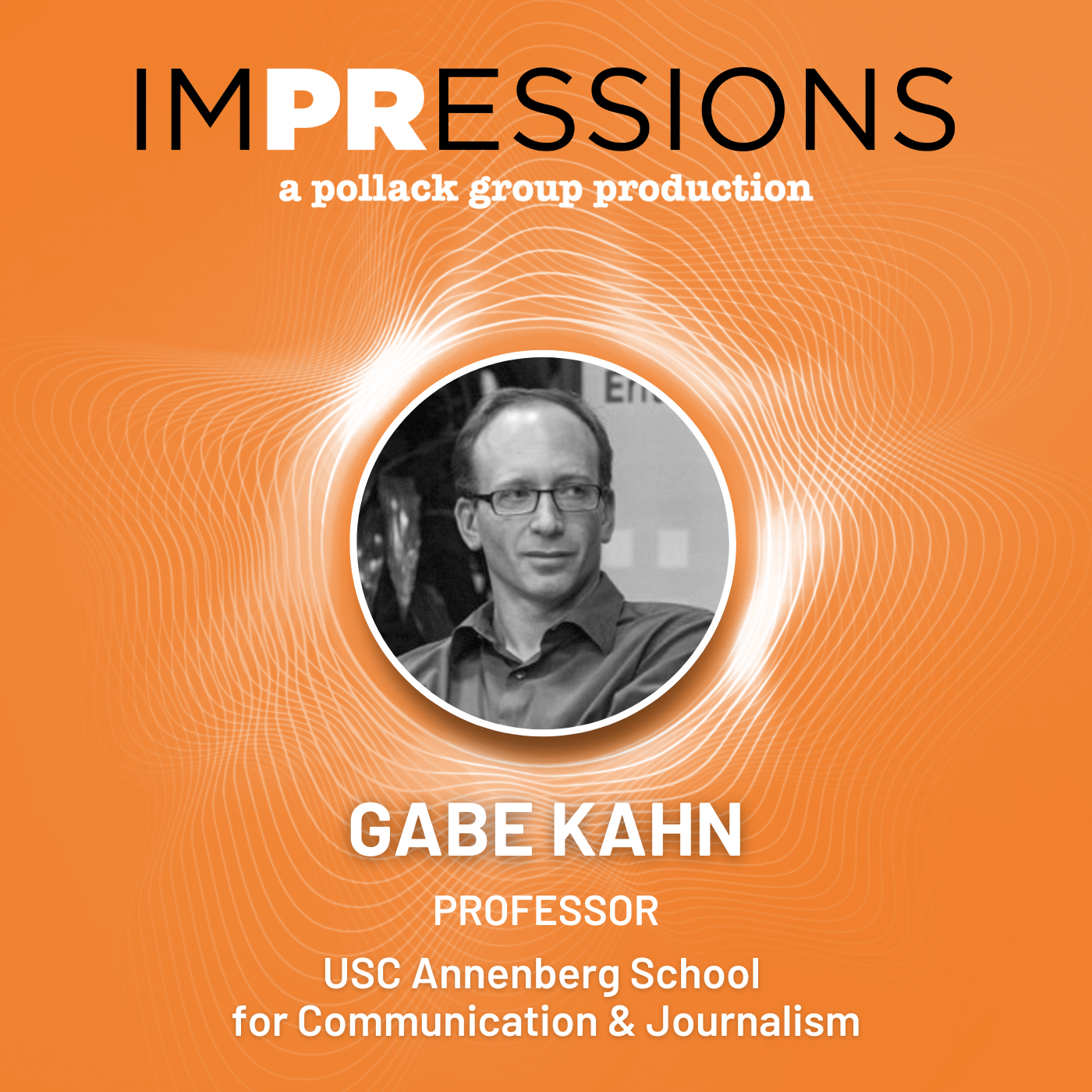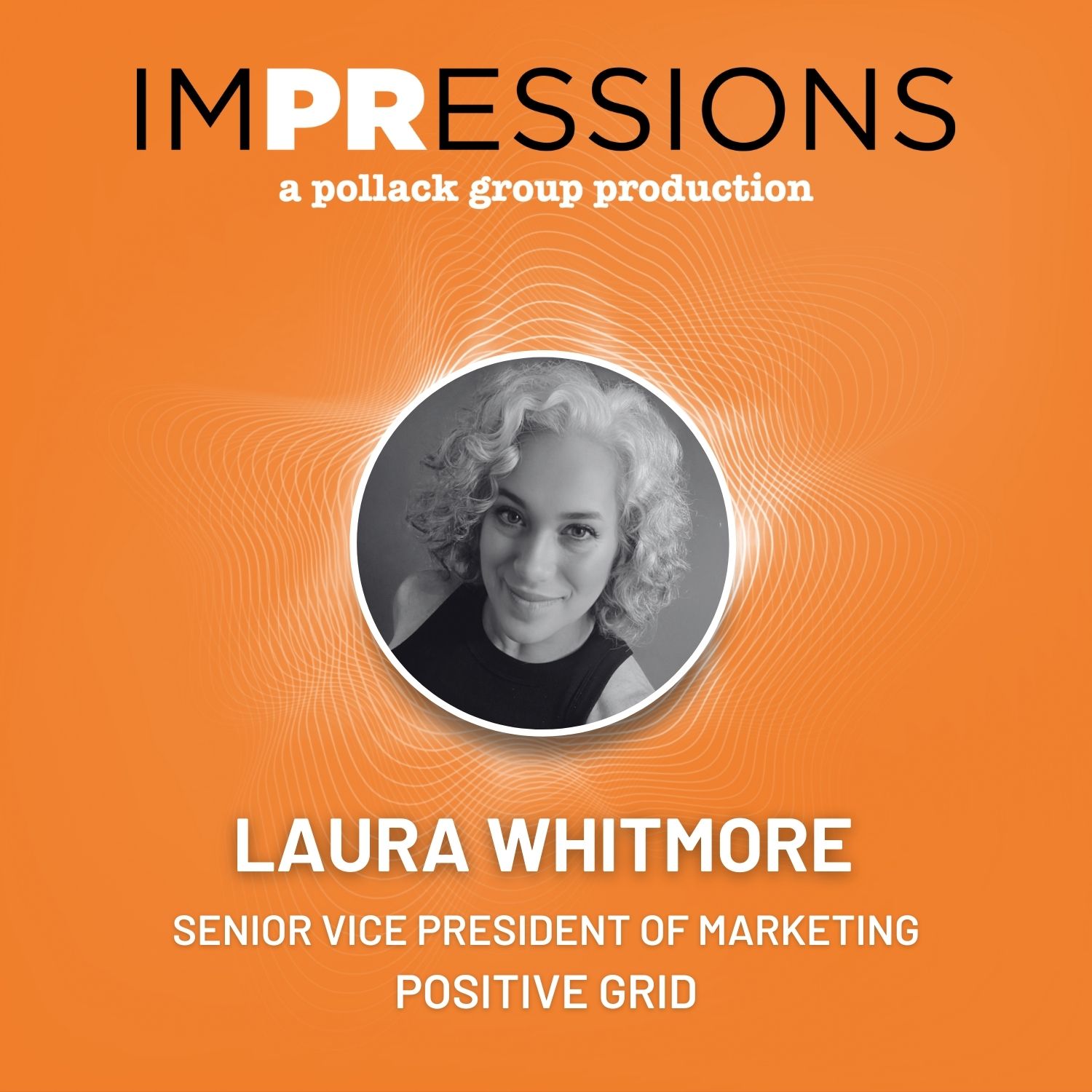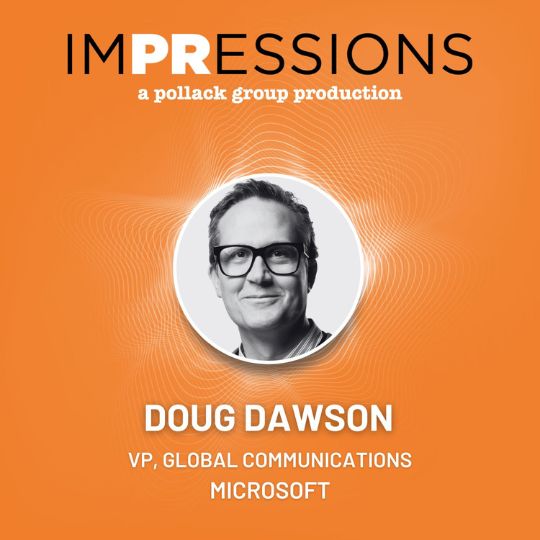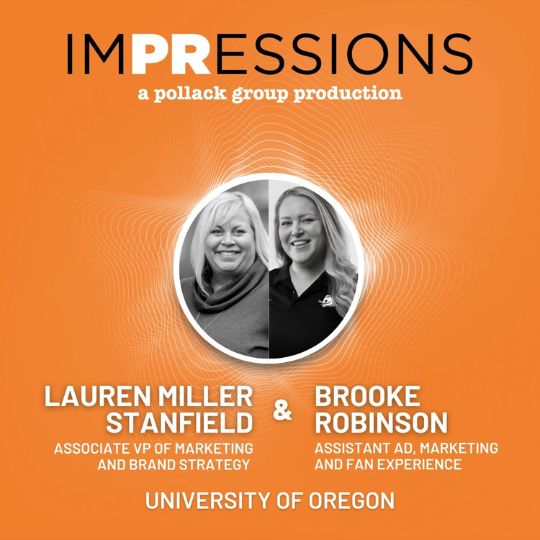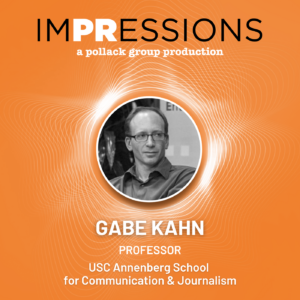 Nothing small town about episode 12’s topic. Gabriel Kahn, a newspaper correspondent, and editor for three decades, including 10 years at The Wall Street Journal, and founder of Crosstown, joins the podcast to discuss the benefits of local journalism. While many PR professionals are instructed to get the highest level of coverage for a client, sometimes the most effective approach is to check around in your own backyard. While national media is important, today’s episode explains why the benefits of local journalism should never be discounted.
Nothing small town about episode 12’s topic. Gabriel Kahn, a newspaper correspondent, and editor for three decades, including 10 years at The Wall Street Journal, and founder of Crosstown, joins the podcast to discuss the benefits of local journalism. While many PR professionals are instructed to get the highest level of coverage for a client, sometimes the most effective approach is to check around in your own backyard. While national media is important, today’s episode explains why the benefits of local journalism should never be discounted.
Impressions Episode #12 Transcript
Jenn: Most PR professionals are instructed by clients to obtain top tier media. Studios and founders want to be the prime talking head on CNN or featured in New York Times. While mainstream media exposure is important, clients should never discount the benefit of local journalism. Communities, especially in small cities survived based on the efforts of local media, reporters and writers today to discuss the importance of small-town journalism, we’re excited to welcome Gabriel Kohn, founder of Crosstown, a pioneered new approach to local news through data and member of USC Annenberg, jointly running the Media Economics and Entrepreneurship program.
Jenn: Hi, Gabriel. Thanks for joining us today.
Gabriel: Hi. Thanks so much for having me.
Kalli: We are actually really excited to talk with you today. Jenn had mentioned you, you know, you’ve worked for a few prominent publications such as The Wall Street Journal. You’ve appeared on numerous top broadcast news programs like BBC and CNN. So tell us a little bit about how those experiences inspired you to launch Crosstown, which is an organization designed to address crisis in local news.
Gabriel: So when I was in daily journalism, which lasted for about 20 years, I covered Washington, DC, US Congress. I was overseas for ten years with the Wall Street Journal in Hong Kong, in Italy, and then I was the bureau chief. So, you know, I was really not doing any local journalism in my reporting career. I was really kind of focusing more on national or international issues, again, often for, you know, publications of a certain size. However, during that time, what really became clear to me and this is sort of late 90s through 2010 was that the business model that had allowed us to have a vibrant, independent, fact based press, the business model behind that was kind of eroding. And I became really interested in trying to understand, well, what is it going to take to find a way to sustain news organizations? When you look at that picture, you realize that the Wall Street Journal, The New York Times, The Washington Post are all fairly healthy financially. However, at the local level, it’s a disaster zone. And that’s partly because the costs it takes to produce local news aren’t that much smaller than the cost it takes to produce national or international news. A reporter at a local paper gets paid less, but not that much less. The problem is that they have a smaller audience, so they can’t monetize their content to the same degree that a national publication has. And we’ve seen this appearance of what’s called News deserts, a term coined by someone named Penny Abernathy, where you have vast stretches of the country with no local news reporting. And that quickly became apparent to me as the real sort of base problem. If you want to think about this as an ecosystem. The kind of plankton were disappearing.
Jenn: Yeah. And guess it makes sense because the whole setup of having a broadcast station and a news studio and having reporters and camera crew, it’s pretty extensive. So it makes sense that the budget and the amount of effort and money put into a local news station is the same as your, you know, quintessential CNN. But guess you don’t think about it in that mindset when you put on a local news station versus putting on NBC.
Gabriel: Right. And so what also isn’t clear is that we you know, we tend to focus a lot on national news, national news or international news. You know, winds up in our inbox, on the radio, everything else. And I think that it’s important to cover these topics. Absolutely. But the coverage of local news, in a way, is a much more essential ingredient in our lives than we realized. And it’s kind of, you know, as Joni Mitchell said, you don’t know what you got til it’s gone. When you have a community that used to have a local news organization and that local news organization has dried up and gone out of business and disappeared, certain things happened to that community. And this has been documented in a number of different academic studies. One thing is lower voter turnout. Two fewer people run for office. Three, there’s generally more corruption in the municipal government and the borrowing costs the bond, you know what they pay when they borrow money goes up for that reason. The other thing that happens, people get less local news. They start to consume more national news. National news is very polarizing. National news is one of the reasons why we all hate each other so much when there’s local news, when we’re talking about repairing potholes, people don’t generally disagree that we should repair potholes. And when you have local news doing that kind of basic accountability journalism, making sure that a local government services are being delivered or something like that, it really helps a local community. And without it, things get kind of scary.
Jenn: Absolutely. And by the way, feel free to quote Joni Mitchell as much as you want. During this episode. She is one of my favorites. So want to ask you a question because we live in I want to say incredible time, but it’s also like kind of a scary time with the onset of social media. News spreads fast like wildfire, and that can be good sometimes, but oftentimes can maybe be not so good. So what I’d like to know is how do you feel that social media impacts the local news ecosystem?
Gabriel: There’s two ways in which it’s impacted. So, one, you know, social media as well as search have eroded that business model, meaning that the advertising that local media used to collect is now being collected by Google and Facebook, basically. And local media has not been able to find other sources of revenue in terms of subscriptions and things like that. The way that a New York Times might. Now, of course, local social media has allowed local media to sort of find audiences and reach some of those audiences in a more sort of frictionless way. And that’s been good, but they have not been able to monetize that. So they’ve actually started to disappear. The other the problem also with that is that the way in which social media codifies all of us who use it basically tries to put us into different buckets so that we can be better, more efficiently targeted by advertising. That has a really bad impact on local news. And this has been studied and also revealed in something called the Facebook files, which was a massive leak of documents at Facebook, things that piss people off, get them to stay on social media longer. So that’s going to be more polarizing news, anger, things like that. That’s generally generated at the national level. And it’s difficult for local news to have that same kind of stickiness on social media. So the deck is sort of stacked against it. But again, communities that don’t have like a local news organization tend to then degenerate into Facebook groups or things like that as way of spreading news. That’s often a very toxic environment. And local news sort of acts as a way of kind of grounding everything in some type of fact based reporting can vet it. One of the ways to think about local news is that it allows a community to have a conversation with itself. Without that, it kind of degenerates often into these shouting matches or the digital equivalent of shouting matches.
Jenn: I find it really funny that you said that people typically stay on social media longer when they’re upset, because I find for me it’s the opposite. Like up three, four times a day, I want to throw my phone across the room. I go on Twitter and I’m just like, I can’t do this anymore. So it’s funny, but also, like I’m rarely tweeting or saying anything that would be like controversial or emotional. But I see it and I’m like, I don’t know how people have time for this.
Gabriel: Right? Don’t forget that it’s that way because it’s designed to get a rise out of you. That is the stuff that’s going to get a rise out of you is being upvoted into your feed. Now. You might be healthier and saner than many people and you don’t take the bait, right? Or you realize that it’s triggering you in a way that doesn’t improve your life and you’re able to walk away from it. But don’t forget, the whole goal of these platforms is to keep people there longer. And the reason why you see more sort of toxic material on these platforms is because that’s what keeps people there longer.
Kalli: It really is. And, you know, a lot of people see social media as their, you know, their kind of soapbox. And, you know, they can say whatever they want because they’re they’re hiding behind a screen. It’s not the same thing that you’re going to find in the news, that it’s an anchor, that, you know, this is their job. They’re being professional. You know, these are people that are just sharing their thoughts kind of based on the triggers that they’re that’s being served to them.
Jenn: Kalli and I only share like cat videos back and forth. There we go. So, yeah.
Gabriel: Well, that’s what the Internet was designed for. And and then we’ve got off on some other tangent.
Kalli: Yeah. And that’s, you know, and that is one of the important things because, you know, as social media has risen, you know, like we’ve seen local media, you know, it’s unfortunately trending in the opposite way. But that doesn’t mean it’s not still important. You know, what do you think is the most important attribute of local media?
Gabriel: The most important attribute of local media is that it helps people. It helps give people a sense of place. So it helps people feel that they are part of a community and are again able to have a conversation with the community that they’re a part of through a mediated means. You know, Now this means that there are reporters who go out and report and put that together and deliver that news. You know, not simply that somebody screams on a nextdoor platform about some, you know, ring doorbell footage that they picked up.
That’s very different. And so when you don’t have that local news, you’re sort of ripping the guardrails off of the conversation and it quickly degenerates. And that’s been shown to happen. Time and time again. The strange thing about local news is or even, let’s just say a local newspaper and again, this is backed up by some pretty rigorous research. It really does have this positive impact on civics and civil society in terms of, again, voter turnout, all of those things. And you don’t even have to read the newspaper to get those benefits. Those benefits accrue to you. Just if you live in a community with a local newspaper.
Jenn: You mentioned something before about- and I want to dive deeper into this. When a city, a community experiences a decrease in local media, there are a lot of, you know, negative attributes that can happen. People aren’t voting. You know, a lot of they’re getting their fake news on social media, as we talked about before, because they don’t have any, you know, actual esteemed reporters giving them the real information and facts. Can you talk to us a little bit more about the impact on an entire community when there isn’t that local the presence of local news? And tell us a little bit more about how Cross Town caters to that issue.
Gabriel: So the first thing, again, if you want to think about a few different forces at play. So one is just having a voice from a news source that, you know, shows up every day, shows up for, you know, a city council meeting or shows up for a school board meeting, things like that does some coverage of crime and things and, you know, prices for real estate, things like that, what kind of conversation that cultivates. And then when you take that away, where does that conversation go? So there’s no more professional news gathering in that community anymore. Instead, information and news is passed on Facebook groups on nextdoor communities and so on and so forth, where there is not the same process of fact finding and vetting and things like that. And don’t forget, your media diet is much like your food diet. If you eat junk food, there are health consequences. So as that, what we would just call traditional news source disappears. What is available in plentiful quantities is junk news. News that is designed just to get you to click on it. News that is designed to get a rise out of you, not news that’s reported and so forth. And that has health consequences as well. Right. And I’m sure that we’ve all seen this. People who are get really worked up about something that you kind of know is a conspiracy or not grounded in fact, etcetera, etcetera. Those people then take that junk food media diet and repeat it and spew it onto those Facebook groups. And the level of conversation and discourse degenerates very quickly. So it’s two things. It’s the business model that no longer was able to support. So many of these local news outlets combined with a conversation mediated on social media where the most outrageous triggering views are what get the most stickiness for the platform. So those two things together really, really sort of make the environment much more toxic.
Jenn: People just seem so easily persuaded that like, for instance, I’ll see something about Facebook that I don’t know, some distant family member that I don’t talk to anymore who’s following some conspiracy theory. And the link will say, like NBC News with a Z or something. And I’m like that. That’s not legit. But they don’t look at that. They don’t they don’t see that it’s an illegitimate source and they just see. So it’s it’s tricky.
Gabriel: So think about this. It’s called the news feed. In Facebook, right on that news feed, you’ll see an article from The New York Times, from The Washington Post. Then you’ll also see anything else. Right. It’s a conveyor belt of links. And the issue is that everything is mixed in together like that. So for the consumer, it’s very difficult when you’re seeing broccoli and carrots and things like that go by and then all of a sudden there’s some, you know, Doritos that go by and they’re all in the same thing. They all look like a duck and smell like a duck. And it’s difficult sometimes to figure out why this is healthy for you and this is not. So it’s got this great sort of commodifying influence that puts everybody to the same degree where it becomes much more difficult for the consumer to distinguish. So that’s also part of the problem.
Kalli: Yeah. I mean, I know and even in our initial discussion, you know, we talked a little bit about this that a lot of people take what they see, you know, and it’s the first thing they see and that’s their impression. And a lot of times that is, you know, the misinformation when news outlets that are reputable or there are sources out there that are reputable combat these, you know, misleading ideas and thoughts, you know, then the people that that accepted the first one they saw from NBC News with a Z, you know, then they don’t believe it. And then, you know, it gives a sentiment. A lot of people are say, oh, well, you know, the whole new system is corrupt. And it’s like. No, it’s not. There’s just so many voices out there. And there really is a difference between news and, like you said before, junk news.
Gabriel: So think about this. We said remember earlier I talked about how Google and Facebook and other social media platforms eroded the advertising base of all news media because they started collecting that money rather than news media itself collecting that money. So that means that that the publications that could started relying more heavily on subscriptions. So a subscription to these publications cost more and more because that’s now the lion’s share of their revenue. So we now have a situation where junk news is free and quality news is behind a paywall, right? So that creates a perverse incentive structure for consumers because they can get quote unquote, news that again, looks like and looks like news and smells like news for free, but they have to pay for something. It’s similar to how we see obesity levels striking impoverished communities more than they strike wealthier communities. Right. Because it actually healthy food costs more and you need access to it. And people live in food deserts where they don’t have access to it. Well, people live in news deserts where they don’t have access to it.
Kalli: That’s so true. And thinking of it from like our point of view is as PR people, when we’re working with a local reporter as opposed to, you know, a national name, you know, obviously there are differences between local news and national news, But, you know, in your opinion and in your experience, you know, what are the main differences in pitching that a PR specialist should be aware of? You know, when they’re speaking to someone that’s local as opposed to, you know, a national name.
Gabriel: Again, it’s sort of so much depends on the client and everything else, right? I think that PR professionals should think about the tenuous infrastructure of local news and think like, how can you know, how can I feed this in a way that’s useful to them and useful to my client, Right? Not in a way of like, let me just get good coverage from my client or something like that, but how can I, I help enrich their, their resources and their sourcing. Maybe I have a client who has expertise on this, maybe have a client who’s got an idea about a problem that this this person has written about before or something like that. Right. Think about it more in a collaborative way rather than in just sort of from purely the client’s interest. And I can tell you as a reporter for many years, the people who understood what my needs were, as well as what their clients needs were, were more effective. Those who just thought about what their clients needs were did not provide me narrative and opportunities that that really worked for them or for me. So, you know, this could be like there’s, let’s say, a structural engineering problem. Or in California here we have all of this seismic retrofitting that’s going on for apartment buildings and things like that, trying to make them earthquake safe. Well, maybe you’ve got, you know, a construction client or an engineering client or something like that. Who knows something about that. So rather than getting coverage of, you know, hey, we have a new product that we’re trying to pitch, maybe just saying, you know, I’ve got someone with a lot of expertise in this issue and they can talk about some of the hurdles involved in improving this. And, you know, I see that you’re writing about this. Maybe you’d like to hear from them, Right. But sort of helping them do their job in a way that improves that information environment.
Jenn: So I want to ask a question because you mentioned this before, that your career has kind of taken you all over the world, most notably in Hong Kong and Italy. How did the local media market differ abroad versus here in the US?
Gabriel: So journalism is very culturally specific and it doesn’t translate well from one culture to another. That is like if you were to try to just translate a Japanese newspaper article into English, it would have a structure and a rhythm that would be very difficult to recognize and vice versa. So, you know, in in Hong Kong, what was beginning to happen was that the Beijing government was starting to crack down on freedom of expression, freedom of the press in Hong Kong, which had long been a bastion for that type of freedom of expression. And now since I left, it’s gotten much, much worse. So they’re really sort of understanding the looming shadow of state control that would work in so many different ways that would start to limit what people would want to say, what people would be willing to write or broadcast. And now it’s gotten to the point where there is really only one public narrative available in both Hong Kong and mainland China, which is the one dictated by Beijing. Italy is kind of the opposite total chaos. And, you know, these are smaller countries. So they also have tremendous like Italy has tremendous regional differences in that way. Kind of local news still has a foothold because people have very strong local identities, whether it’s relating to a soccer team or to food or something like that. Local news helps fit with that building of sense of. Community and identity. And so there’s a there’s a lot of sort of opportunity there as well.
Jenn: Yeah. It seems the general consensus is that local media, no matter where you are in the world, what country, what city, it’s so important, it’s so crucial to make sure that the community stays ahead of what’s happening around them.
Gabriel: Absolutely. Yeah. When it works well, you know, and so part of the problem is that you’ve got these legacy local news organizations that print their news on paper, and that’s not how people read news anymore. And it’s difficult for them to make transitions because they’re not very well financed. So you kind of have a product that doesn’t fit with the way that people consume news and information now. And so that’s something we’ve been struggling with for 20 years.
Jenn: Absolutely. I mean, as we said before, from the spread of inaccurate facts on social media to distrust in the news, local media is crucial now more than ever. So, Gabriel, thank you so much for shedding light today on this important topic. It has been a pleasure talking to you.
Gabe: Likewise.
Jenn: Have the guests in mind want to say hello? Email us anytime at ImPRessions@pollackgroup.com. See you all soon.

